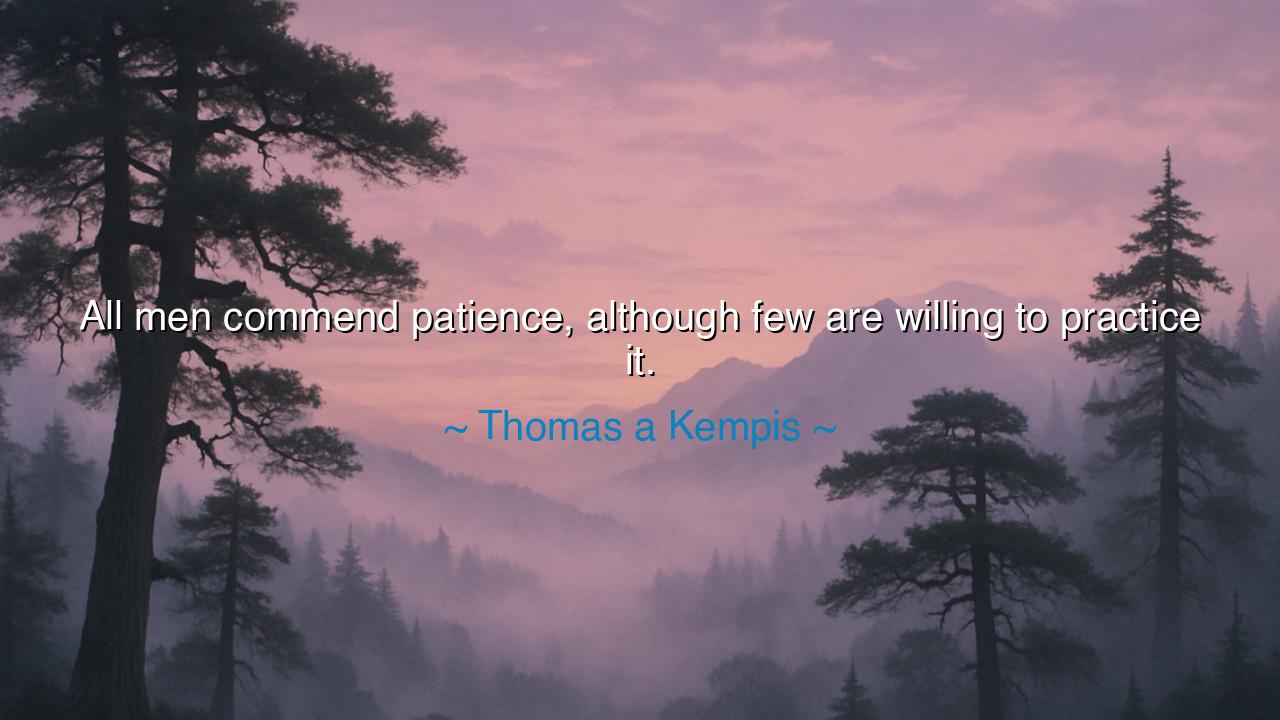
All men commend patience, although few are willing to practice






Thomas à Kempis, the humble monk of the fifteenth century and author of The Imitation of Christ, gave us this piercing truth: “All men commend patience, although few are willing to practice it.” These words, born in the cloisters of quiet devotion, echo through the centuries as a mirror of human frailty. For who does not praise patience? It is lifted high in proverbs, sung in sermons, taught in every tradition. Yet when the fire of trial burns, when the heart is pressed by delay, how few truly hold to it.
To commend patience is easy, for it costs nothing to praise a virtue in word. But to practice patience is to endure suffering without bitterness, to wait in silence when the heart cries out for action, to carry burdens with grace instead of complaint. This is the harder road, for it demands not only outward stillness but inward strength. Thus Thomas à Kempis saw the contradiction of mankind: that the virtues we honor most with our lips are often those we abandon first in our lives.
History gives us shining examples of those who practiced what others merely commended. Consider Nelson Mandela, who spent twenty-seven years in prison. He might have surrendered to anger, to vengeance, to despair. Instead, he chose patience, biding his time, nurturing his vision of freedom for his people. When release finally came, his patience bore fruit not only for himself but for a nation. Others praised the virtue of waiting, but he lived it, and in living it became a giant of history.
Contrast this with the countless rulers and generals who, unable to wait, rushed headlong into disaster. How many wars were lost because a commander struck too soon? How many treasures wasted because a king demanded riches without sowing the seed of labor? The annals of history are full of men who admired patience in word but scorned it in deed, proving the truth of Thomas’s saying. To fail in patience is to reap ruin; to hold it is to reap wisdom.
The deeper meaning of his words lies in this: true patience is not passive, but active. It is not merely the absence of action, but the presence of strength. It is the steady flame that endures the storm without flickering out. It is the farmer who waits for the harvest, knowing that the seed cannot be hurried. It is the mother who bears with her child, the friend who endures in loyalty, the seeker who waits for truth to unfold. To practice patience is to align oneself with the rhythm of time itself.
Therefore, O listener, take this lesson to heart: do not merely praise patience with your lips—live it with your life. When trials come, do not complain at once; when delays arise, do not despair. Instead, breathe, endure, and let the waiting shape you. For patience is the teacher of humility, the forge of strength, the guardian of peace. Without it, wisdom withers; with it, even suffering is transformed into growth.
Practical action is this: begin with small acts of patience each day. Endure the slow task without anger. Listen to others without rushing to reply. Accept the delays of life as opportunities to grow in steadiness of spirit. Train yourself in these lesser things, and when greater trials come, you will have the strength to endure them.
So let Thomas à Kempis’s words endure as wisdom for every generation: “All men commend patience, although few are willing to practice it.” Do not be among the many who only praise, but among the few who truly live the virtue. For in patience lies the secret of victory—not sudden, not loud, but quiet, enduring, and eternal.






AAdministratorAdministrator
Welcome, honored guests. Please leave a comment, we will respond soon